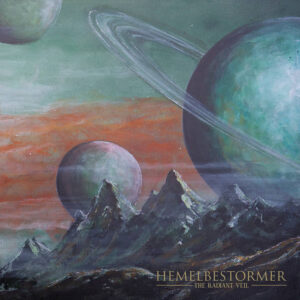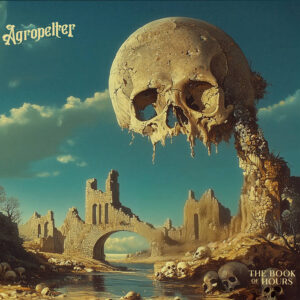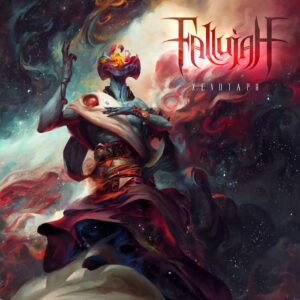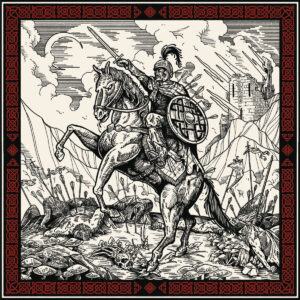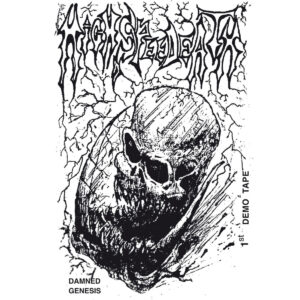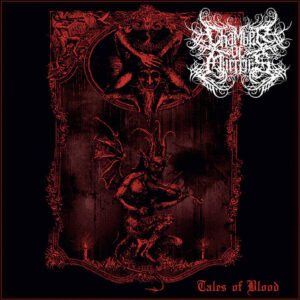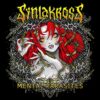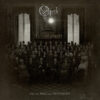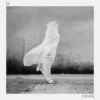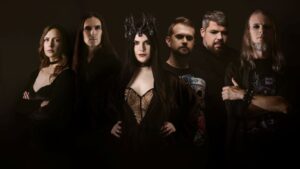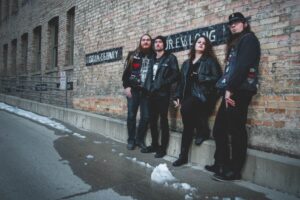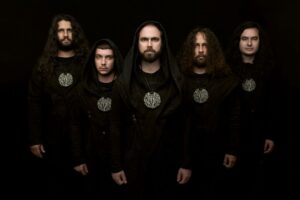Simon Bibby
Thy Listless Heart
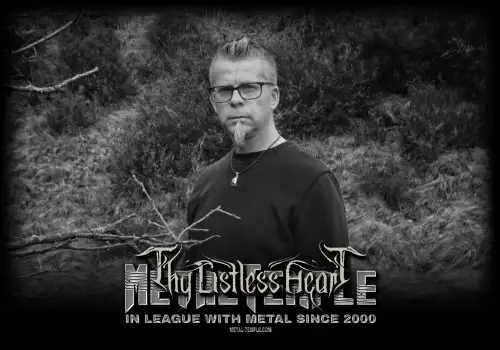
Hi Lior – thank you for your interest in Thy Listless Heart – it's an honour to be asked to do an interview for Metal Temple! I've been doing pretty well thanks…. just recovering from the chaos of Christmas and New Year.
Well technically, yes Seventh Angel is still in existence but practically speaking we haven't gigged or written any new material for a long time. Releasing 'The Dust of Years' back in 2009 was really on a whim after all meeting up at a party. Who knows – maybe we'll decide to do it again one day after a few drinks have clouded our better judgement.
As much as I enjoyed playing and writing faster, and some would say more complex music in Seventh Angel, my true musical love is Doom. Ever since discovering Candlemass and Trouble in the late 80's I have wanted to have a go at writing and recording something which is more true to myself, more honest and also to test myself – to see if had what it takes. As you get older you start to consider all of the things you have wanted to do but failed to achieve, and so as I was fast approaching 50 years old and as Covid struck I thought it was time to make it happen somehow; after all – there are no guarantees for tomorrow and that became really evident as the world descended into a global pandemic.
'Pilgrims on the Path of No Return' is a line from the first song on the album called, 'As the Light Fades'. In that context it is about both my own personal spiritual journey and also about the wider physical journey we all share as human beings.
I grew up in a very committed Christian environment – for many years it was the world in which I existed, and I held fast to particular beliefs and behaviours. However, over time I started to increasingly question things which eventually enabled me to take a step back far enough to properly evaluate the things I had professed to believe. I no longer consider myself a follower of any faith – this is my ongoing journey – my Pilgrimage.
And in the wider sense, we are all Pilgrims journeying to an ultimate end that we won't return from. I don't see this as something that's necessarily depressing or hopeless – this is our shared reality. What is important is that we don't journey alone, that we walk the path together.
It's really interesting to see how people have reacted differently to the atmosphere and emotion of the album. Some people have found it utterly sorrowful and without hope and others have found great solace in it. I've actually been contacted by a number of people who have told me that the album has helped them at a time of loss and bereavement, which is incredible to me.
I am actually a pretty positive and hopeful person at heart. But I also recognize and acknowledge that life can be brutally difficult. I have worked with people who are in crisis for over 30 years – people who see no little or no hope for the future. I am also an adoptive parent and foster carer. I feel that I understand pain and sorrow and loss – I see it first-hand on almost a daily basis. Maybe 'Pilgrims on the Path of No Return' is in some way my attempt to process these powerful emotions and trying to find some kind of resolution.
I think the only thing that I can guarantee any listener will experience is emotion. This is not an accident – I set out to create an album that is emotional, honest, vulnerable. This won't appeal to everyone but, judging from the feedback I've had so far, if you do connect with it that connection will be deep and powerful.
I don't believe everyone can be saved and I don't believe in Hollywood endings. But I do believe in the strength and endurance of the human spirit, and I believe that beauty and sorrow, love and pain are common to us all.
I love this painting. It feels like Mariusz painted it with this album in mind, which is of course impossible as he completed it in 2016. Rarely does an album cover express so fully the heart of an album and I feel very privileged to have been able to use it. I especially like the fact that the painting offers no clue as to what lies beyond the distant light the pilgrims are walking towards – it's a mystery and will remain so.
I've never really considered it, but I suppose my way of writing and structuring songs has been influenced by being in Seventh Angel. I still like a lot of variety in songs – light and dark, soft and heavy – it's important for me to be able to create crescendos in songs as this works as a great vehicle for carrying emotion.
I think I've probably always had a bit of an inferiority complex about my ability as a musician. As a result of that I focus less on complex individual parts and make more use of layers in songs. That inevitably leads to another problem – knowing when to stop!
The vast majority of the material on 'Pilgrims' is new or at most a few years old. Some of the lyrical ideas are older and some of the lyrics used date back to the mid 1990's.
When writing, the question I am asking myself is, 'does it make me feel something?' My writing process for this album was slow and had to be approached differently with it being a solo project. I would have an idea and almost immediately record it. I would then add a layer or two in order to decide if it could be used in the context of a song. I repeated this process again and again until songs started to form. There was a lot of re-writing and re-working of parts – I approached the album as if it was the last musical thing I'd ever do and so it had to be right.
Well, this album was in some ways a test to see if I really had it in me to create something myself. But on top of that it was an opportunity for me to be selfish in a musical sense. Being part of a band is an amazing experience in many ways but there is always the need for compromise (in functional bands anyway). I wanted to do something that was fully and authentically of myself and there is just not space for that in a full band.
However, there are others who have contributed to the album as guest musicians and I feel that 'Pilgrims' is all the richer for their wonderful input.
Yearning is a song about the idea of slowly losing someone you love to Dementia. It may be an unusual topic for metal, and music in general but I can think of few situations that are more heart rending – to see the person that you have known intimately for however many years just slipping away in front of you to the point of no longer knowing who you are. The song finishes with the idea that they will be reunited in the grave.
I find that in order to convey emotion it's important to use melodies that are not solely dark or depressing – they have to also be majestic in nature and these can lift as well as being crushing atmospherically. When recording vocals for each of the songs on the album I really tried to capture as much emotion as possible to give sufficient weight to the subject matter.
To be honest, when Guido from Hammerheart Records suggested we use Yearning as the second single I initially didn't agree as I thought a more immediate song would work better – maybe Confessions. In hindsight I think Guido was correct.
The biggest obstacles in writing and recording the album were the age-old enemies – lack of time and lack of energy. Life is busy. Having a full-time job and a large family meant that I had to carve out time where I could. The Covid lockdowns helped to a degree as the entire world slowed down for a while, but it was still a mammoth task. Thankfully my wife, Kristy was very patient with me (most of the time).
I think another difficulty with doing a solo project is keeping perspective – it's easy to disappear down a rabbit hole and I had to completely walk away from the project for about 3 months in order to maintain my sanity.
This is a question that keeps being asked. Greg Chandler, who mixed and mastered the album messaged me a few days ago to encourage me to form a live band. However, as I just said – life is busy and I don't want to put unnecessary pressure on myself. I haven't written the idea off entirely, but for now I'm sticking to the original plan of Thy Listless Heart being a solo project.
Thanks once again Lior – it's been great to be able to talk about my little project.

More results...

